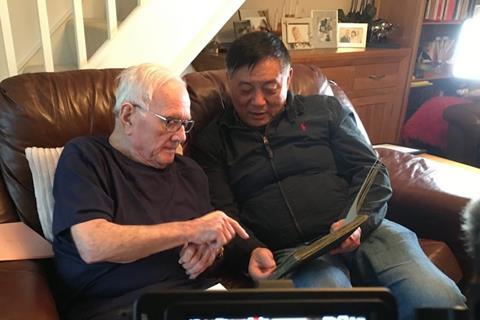Fang Li explores the 1942 sinking of a Japanese cargo ship in this Chinese awards hopeful

Dir. Fang Li. China. 2024. 122mins
In September 1942, a total of 1,816 Allied prisoners of war were aboard the Japanese cargo ship Lisbon Maru as it travelled from Hong Kong to Japan. After three days at sea, the ship was struck by a torpedo fired by the USS Grouper within the proximity of Dongji Island in China’s eastern Zhejiang province. During a 25-hour ordeal on the steadily sinking vessel, the POWs went to great lengths to save themselves – despite being locked in the hold by the Japanese troops. Over 800 POWs perished, but Chinese fisherman braved Japanese gunfire to rescue 384 survivors and provide them shelter in their island homes. It’s a relatively obscure piece of Second World War history which cries out for cinematic excavation.
At the core of the documentary is a gripping survival story
Producer-turned-director Fang Li embraced the challenge: his resulting documentary The Sinking of Lisbon Maru has proved to be a surprise box office success in China following its release on September 6, grossing approximately $5 million in limited release. On paper, there are considerable international prospects here too. At the core of the documentary is a gripping survival story pivoted on the fateful intersection of four nations (China, Japan, the UK, and the US) which do not always enjoy harmonious relations. Unfortunately, frustrating structural issues and an overlong running time hinder a sincere effort to familiarise a wide audience with the dramatic events and multi-generational trauma of a harrowing wartime incident.
Submitted it as China’s official Oscars entry for Best International Feature Film, it was ruled ineligible because over 50 percent of the dialogue is in English. It has subsequently been submitted in the Best Documentary Feature category, although The Sinking of Lisbon Maru seems best suited to the small screen, where it will draw the attention of history buffs.
The documentary starts with Fang recounting how, after becoming aware of the Lisbon Maru while producing a feature film on Dongji Island in 2014, he spearheaded a successful mission to locate the missing vessel. Fang’s quest essentially constitutes an extended preamble; the logistics and obstacles of his self-assigned mission are covered in truncated fashion, culminating in a self-congratulatory manner. The film then becomes a record of its own making as Fang leverages the media attention afforded by his discovery to chronicle the tragedy of the Lisbon Maru.
It helps that the story has already been told in other forms – the historian Tony Banham wrote an extensively researched book with the same title as this documentary, published in 2006, while oral histories were gathered by the Imperial War Museum. Fang uses these resources for his retelling, which is the strongest strand of the documentary. Through a striking blend of photographs and expressionistic hand-drawn animation courtesy of artists Wang Pu and Fan Qing, Fang pays tribute to the British soldiers who demonstrated resourcefulness upon realising that the ship would soon be an underwater coffin.
Unfortunately, the sense of immersion is interrupted by a third strand in which Fang interweaves his detailed recreation with interviews with descendants of the POWs. The intention is a noble one – to bridge time and space by showing how the past impacts the present. In practice, though, it causes a jagged back-and-forth between life-or-death immediacy and pent-up reflection.
This is entirely a structural impediment since each strand is of great interest. In terms of personal narratives, interviews with descendants of the POWs and the American and Japanese officers involved movingly fill in their relatives’ backgrounds, relationships and unfulfilled aspirations. As an examination of the trauma of war, the interviews with two remaining survivors (both of whom have since died) illustrate markedly different responses to the same distressing experience: Dennis Morley is still haunted by the incident and finds “faces coming back” to him in quiet moments, whereas William Beningfield relocated to British Columbia and optimistically made a new life without looking back.
The Sinking Of The Lisbon Meru also suffers from Fang’s misguided decision to put himself front and centre. Fang is certainly an interesting individual: as the founder of prominent Chinese indie outfit Laurel Films, he has balanced producing films with actively pursuing a passion for oceanography which stems from his studies at East China Geological Institute. But his continued screen presence and insistence on incorporating the exhaustive research process prove distracting, while his flat voice-over narration lacks the gravitas that the subject matter so richly deserves.
Production companies: Emei Film Group, Laurel Films, Shanghai PMF Pictures
International sales: Laurel Films, Shirleyhuang@laurel-films.com
Producer: Fang Li
Cinematography: Florian Zinke
Editing: Lily Gong
Music: Nicolas Errèra.
Features: Fang Li, Dennis Morley, William Beningfield, Tony Banham
























